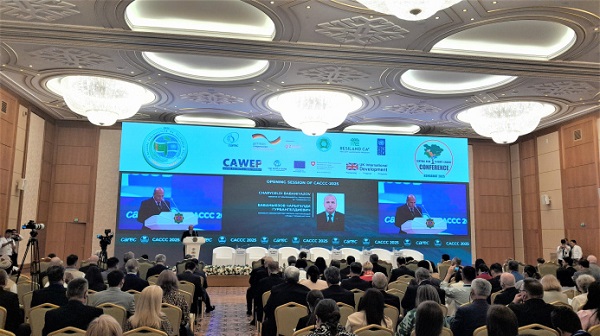Ashgabat, May 13-15, 2025 – The 7th Central Asian Conference on Climate Change (CACCC-2025), held at the Yyldyz Hotel in Ashgabat, Turkmenistan, marked a pivotal moment for regional cooperation in addressing climate change. Organized by the Regional Environmental Centre for Central Asia (CAREC) in partnership with the Government of Turkmenistan, the conference convened approximately 250 participants, including government officials, climate experts, civil society, academia, and international organizations, to discuss climate resilience, finance, and innovative solutions. Turkmenistan emerged as a leader, advocating for unified regional efforts and showcasing national achievements, while the media played a critical role in amplifying the climate dialogue.
Turkmenistan’s Climate Leadership
Turkmenistan’s Minister of Environmental Protection, Charygeldi Babaniyazov, delivered a keynote address emphasizing the nation’s commitment to combating climate change through national policies and regional collaboration. Key national achievements include:
- National Climate Change Strategy (2019): A framework guiding Turkmenistan’s climate actions.
- Nationally Determined Contribution (NDC) under the Paris Agreement (2022): Outlining emission reduction and adaptation goals.
- Global Methane Commitment (2023): Turkmenistan reported a 10% reduction in methane emissions since joining, as assessed by the Kayrros agency in 2024. This was achieved through roadmaps, an Intersectoral Commission, and partnerships with organizations like UNEP and the US State Department.
Babaniyazov highlighted specific environmental challenges facing Central Asia, including the Aral Sea crisis, desertification, water scarcity, and melting glaciers. He cited Turkmenistan’s afforestation efforts—planting 20,000 hectares around the Butendag Upland and 10,000 hectares each in Dashoguz and Lebap velayats—as a national response to desertification. He stressed the interconnectedness of these issues, urging 90% of Central Asian countries, calling for regional cooperation to address transboundary challenges like water management and dust storms.
Regional Cooperation and Initiatives
A major highlight was Turkmenistan’s proposal to establish a Regional Climate Technology Center in Ashgabat under UN auspices. Presented by Deputy Minister Nury Amandurdyevich Djumashov, the initiative aims to coordinate climate technology development and implementation across Central Asia. Discussions also focused on preparing a unified Central Asian position for the upcoming COP30 in Brazil, potentially with a shared pavilion, though financial support remains a challenge.
The conference emphasized regional strategies, such as the Regional Strategy for Adaptation to Climate Change in Central Asia, and explored climate finance through green bonds, debt swaps, and macroeconomic planning. Other sessions covered climate-smart agriculture, disaster risk reduction, and the role of civil society and youth in climate action.
Media’s Role in Climate Dialogue
The media emerged as a vital bridge between science, policy, and society. A pre-conference training on May 12, organized by the World Bank and CAREC, equipped journalists from Turkmenistan, Uzbekistan, Kazakhstan, Kyrgyzstan, and Tajikistan with skills to cover climate issues effectively. Experts like Alexey Kokorin provided scientific insights, emphasizing objective reporting.
At the closing session, Bekdurdy Amansaryev, Director of Media Turkmen Information Agency Orient, underscored the press’s role in translating complex climate data, explaining national strategies, and connecting global decisions to local impacts. He described the climate agenda as a “marathon, not a sprint,” pledging the Central Asian journalistic community’s commitment to sustained coverage. Media outlets, including Turkmenistan’s national media, Uzbekistan’s Zamon, Kazakhstan’s Baige, Kyrgyzstan’s Eltr, and Tajikistan’s Ilm va Hayot, actively reported on CACCC-2025, highlighting its relevance and organization.
Outcomes and Future Steps
The conference fostered a “living pulse of regional dialogue,” as Amansaryev noted, addressing real challenges like the Aral Sea’s drying, water management, and glacier retreat. CAREC’s new Executive Director, Batyr Mamedov, called the event a “starting point” for implementing national strategies and on-the-ground solutions. The event concluded with a commitment to deepen regional cooperation, mobilize climate finance, and enhance climate resilience through shared knowledge and innovation.
Supported by organizations like the World Bank, GIZ, and CAWEP, CACCC-2025 set a robust foundation for Central Asia to speak with one voice at global forums like COP30. The establishment of the Regional Climate Technology Center and ongoing media engagement will be critical in sustaining momentum toward a sustainable future for the region. /// nCa, 16 May 2025
